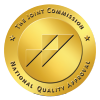Advanced Primary Stroke Center
Northwest Texas Healthcare System in Amarillo, Texas, is a leader in stroke care, providing a higher standard of service for stroke patients in our community.
Quiz: How Much Do You Know About Strokes?
Test your knowledge about strokes, including risk factors, symptoms and statistics.
Nationally Recognized Stroke Care
 We are an Advanced Primary Stroke Center as designated by The Joint Commission’s Gold Seal of Approval® and the American Heart Association®/American Stroke Association® Heart-Check mark. This shows that we have thoroughly demonstrated the greatest level of commitment to the care of stroke patients and that we adhere to a very specific set of treatment guidelines when treating all patients experiencing a stroke or stroke-type symptoms.
We are an Advanced Primary Stroke Center as designated by The Joint Commission’s Gold Seal of Approval® and the American Heart Association®/American Stroke Association® Heart-Check mark. This shows that we have thoroughly demonstrated the greatest level of commitment to the care of stroke patients and that we adhere to a very specific set of treatment guidelines when treating all patients experiencing a stroke or stroke-type symptoms.
 We have also received the American Heart Association’s Get With The Guidelines – Stroke GOLD PLUS with Target: Type 2 Diabetes™ Honor Roll award. Target: Type 2 Diabetes aims to ensure patients with Type 2 diabetes, who might be at higher risk for complications, receive the most up-to-date, evidence-based care when hospitalized due to heart attack.
We have also received the American Heart Association’s Get With The Guidelines – Stroke GOLD PLUS with Target: Type 2 Diabetes™ Honor Roll award. Target: Type 2 Diabetes aims to ensure patients with Type 2 diabetes, who might be at higher risk for complications, receive the most up-to-date, evidence-based care when hospitalized due to heart attack.
Northwest Texas Healthcare System Launches Cryptogenic Stroke Pathway Program
This first-of-its-kind, long-term monitoring and treatment care program is for patients who have experienced a cryptogenic stroke, also known as a stroke of unknown cause.
Remote Consultations Through Telemedicine
Specialty 'telestroke' (telemedicine) services at Northwest Texas Healthcare System help patients receive advanced assessment and rapid treatment during the critical period following the onset of stroke symptoms. Two-way audiovisual capabilities provide immediate, remote consultations anytime day or night. Telemedicine capabilities bring advanced neurological specialties to the bedside at Northwest Texas Healthcare System.
Using secure, advanced telemedicine equipment, specialty stroke neurologists are "in the room" working collaboratively with Northwest's emergency and stroke teams to determine the most effective treatment option for patients.
Telestroke services include:
- Twenty-four-hour availability
- Secure, robotic video conferencing
- Evidence-based clinical treatment
- Consultation and collaboration with board-certified stroke neurologists
Stroke Explained
A stroke is what occurs when blood flow to the brain is blocked or stopped. Within a few minutes of a stroke, brain cells begin to die. This is why it's so important for someone who is having a stroke to get medical attention as quickly as possible. Stroke affects about one person every four minutes in the US, according to the Centers for Disease Control and Prevention.
Stroke Symptoms
Symptoms of possible stroke include:
- Numbness or weakness of the face, arm or leg — especially on one side of the body
- Confusion, difficulty speaking or understanding speech
- Trouble seeing in one or both eyes
- Trouble walking, dizziness, loss of balance or coordination
- Severe headache with no known cause.
If you or someone you're with has any of these symptoms, you must get yourself or them to a hospital immediately. Staff in the emergency department will administer acute stroke medications to try to stop a stroke while it is happening. Ischemic stroke, the most common type of stroke, is treated with the 'clot-busting' drug known as tPA. The drug must be given to patients within three- to four-and-a-half hours after the onset of stroke symptoms.
BE FAST and Save a Life
If you or someone near you may be having a stroke, call 9-1-1 right away. The quicker you call for help, the sooner medical treatment can begin.
Use the acronym BE FAST to quickly identify possible strokes:
Does the person have a sudden loss of balance or coordination?
Has the person lost vision in one or both eyes or have they had sudden double vision?
Ask the person to smile. Does one side of the face droop?
Ask the person to raise both arms. Does one arm drift downward?
Ask the person to repeat a simple phrase. Is it slurred or strange?
Time is critical! If you see any of these signs, call 9-1-1 immediately.
Preventing Stroke
The best way to keep your brain healthy is to avoid a stroke in the first place. The best ways to prevent stroke are to do the following:
- Keep your blood pressure controlled through lifestyle changes and/or medications
- Don't smoke or stop smoking
- Take steps to manage your cholesterol
- Limit your alcohol consumption
- Exercise regularly
- Maintain a healthy weight
Find a Doctor
For a non-emergency referral to a physician at Northwest Texas Healthcare System who can help assess your risk for stroke, contact our free physician referral service at 800-887-1114.
